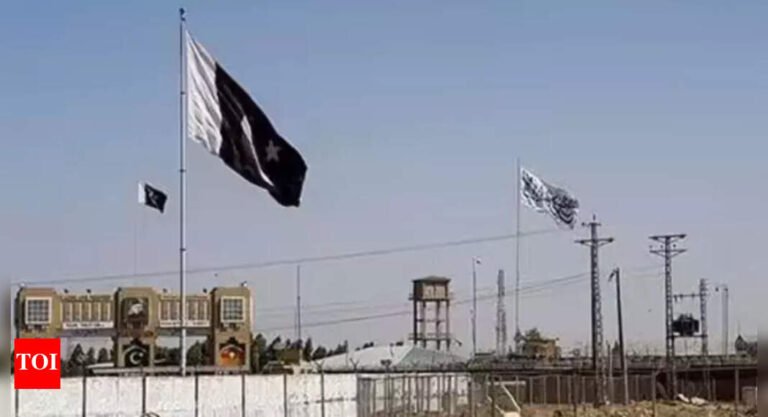
Contents
Pakistan and Afghanistan Agree to Immediate Ceasefire After Qatar Talks
Pakistan and Afghanistan have agreed to an immediate ceasefire after several days of deadly cross-border clashes, according to Qatar’s foreign ministry. The announcement came after at least 10 people were killed in Pakistani airstrikes that followed an earlier truce. Officials from both sides met in Doha on Saturday to ease tensions, and the two sides agreed to establish mechanisms to ensure lasting peace and stability between the two countries.
The recent surge in violence between Pakistan and Afghanistan has raised concerns about the stability of the region. The clashes, which began on October 11, have resulted in the deaths of dozens of soldiers and civilians on both sides. The situation escalated when Taliban fighters launched attacks along the southern border with Pakistan, prompting Islamabad’s response. However, after several days of intense fighting, the two countries have agreed to a ceasefire, thanks to the efforts of Qatar’s foreign ministry.
Background of the Conflict
The conflict between Pakistan and Afghanistan is rooted in a long-standing dispute over their shared border. The two countries have a history of tension, with each side accusing the other of supporting militant groups. The situation has been further complicated by the presence of the Taliban in Afghanistan, which has been accused of harboring terrorists. The recent violence began when Taliban fighters launched attacks on Pakistani paramilitary forces, prompting a response from Islamabad.
Key Highlights of the Ceasefire Agreement
The ceasefire agreement between Pakistan and Afghanistan includes the following key highlights:
* Immediate ceasefire: The two countries have agreed to an immediate ceasefire, which is expected to bring an end to the violence along their shared border.
* Establishment of mechanisms for lasting peace: The two sides have agreed to establish mechanisms to ensure lasting peace and stability between the two countries.
* Talks in Doha: The agreement was reached after officials from both sides met in Doha on Saturday to ease tensions.
* Participation of key officials: Pakistan’s delegation in Doha included defence minister Khawaja Asif and intelligence chief general Asim Malik, while the Afghan side was led by defence minister Mohammad Yaqoob.
Some of the key points of the agreement include:
* The two countries will work together to establish a joint commission to monitor the ceasefire and prevent future clashes.
* The commission will be responsible for investigating any incidents that may occur along the border and taking necessary measures to prevent escalation.
* The two countries will also work together to enhance security cooperation and share intelligence to prevent the movement of militant groups across the border.
Reaction to the Ceasefire Agreement
The ceasefire agreement has been welcomed by the international community, with many countries praising the efforts of Qatar’s foreign ministry in facilitating the talks. According to a statement by Qatar’s ministry of foreign affairs, “During the negotiations, the two sides agreed to an immediate ceasefire and the establishment of mechanisms to ensure lasting peace and stability between the two countries.”
As noted by security officials in Pakistan, the latest strikes in Afghan border areas targeted a militant group linked to the Pakistani Taliban. The attack, they said, came in response to an assault on Pakistani paramilitary forces.
Challenges Ahead
While the ceasefire agreement is a positive step towards reducing tensions between Pakistan and Afghanistan, there are still many challenges ahead. The two countries will need to work together to establish a lasting peace and prevent future clashes. This will require a commitment to dialogue and cooperation, as well as a willingness to address the underlying issues that have driven the conflict.
Some of the key challenges that the two countries will face include:
* Establishing trust: The two countries will need to establish trust and confidence in each other, which will require a commitment to transparency and cooperation.
* Addressing underlying issues: The two countries will need to address the underlying issues that have driven the conflict, including the presence of militant groups and the dispute over their shared border.
* Enhancing security cooperation: The two countries will need to enhance security cooperation and share intelligence to prevent the movement of militant groups across the border.
Conclusion:
The ceasefire agreement between Pakistan and Afghanistan is a welcome development, and it is hoped that it will bring an end to the violence along their shared border. However, there are still many challenges ahead, and the two countries will need to work together to establish a lasting peace. The international community will need to continue to support the efforts of Qatar’s foreign ministry and other regional players to facilitate dialogue and cooperation between the two countries.
Keywords: Pakistan, Afghanistan, Ceasefire, Qatar, Taliban, Border Clashes, Militant Groups, Security Cooperation, Intelligence Sharing, Peace Agreement, Conflict Resolution, Regional Stability, International Community, Diplomacy, Dialogue, Cooperation.
Hashtags: #Pakistan #Afghanistan #Ceasefire #Qatar #Taliban #BorderClashes #MilitantGroups #SecurityCooperation #IntelligenceSharing #PeaceAgreement #ConflictResolution #RegionalStability #InternationalCommunity #Diplomacy #Dialogue #Cooperation
Source link